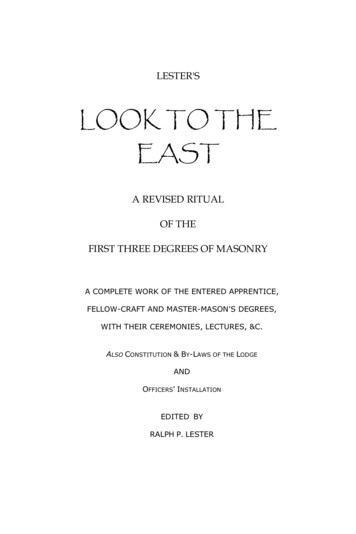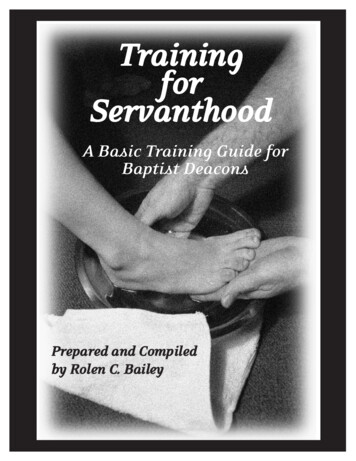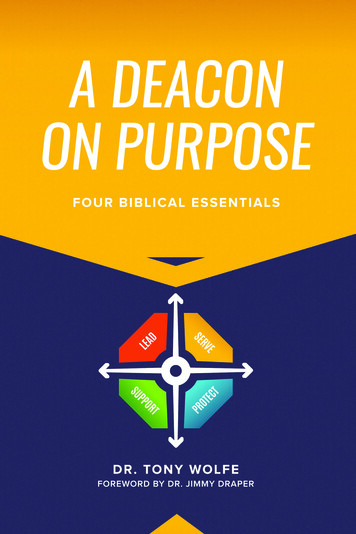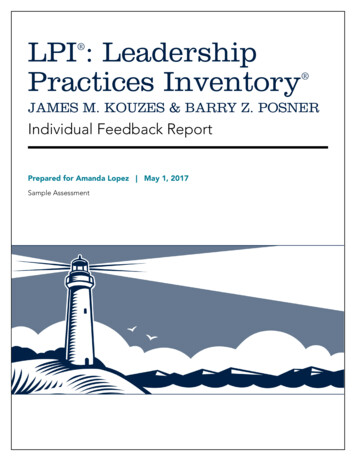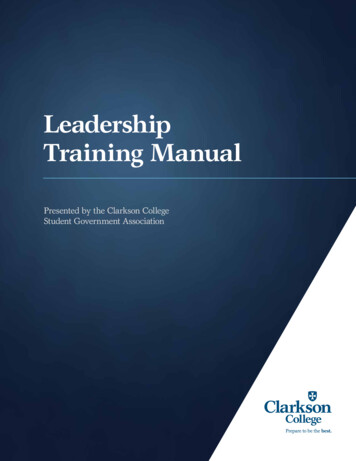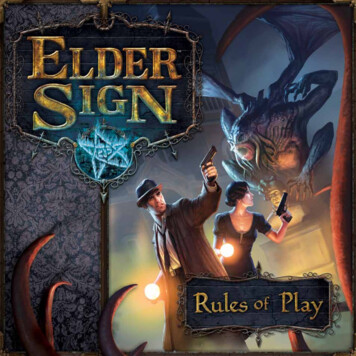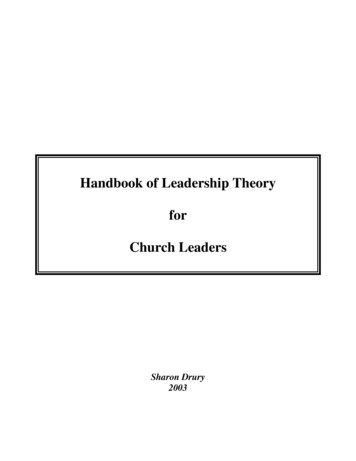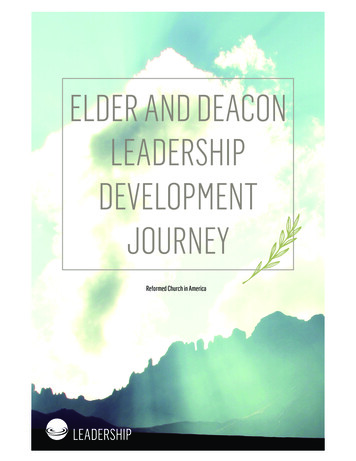
Transcription
ELDER AND DEACONLEADERSHIPDEVELOPMENTJOURNEYReformed Church in America1
TABLE OF CONTENTSIntroductionPart 1: Biblical Foundations.6Biblical Qualifications of Elders and Deacons.6The Biblical Role of Elders and Deacons.9From Division to Multiplication: A Lesson in Leadership from the Early Church. 11Part 2: The Consistory in Church Order. 13Definitions. 13Responsibilities of Consistory. 14Officers of Consistory. 14Transaction of Business. 15Responsibilities of the Board of Elders. 15Responsibilities of the Board of Deacons. 16Part 3: Leadership Development Journey.17Year 1 Consistory Retreat. 19Monthly Meetings for Year 1. 21Meeting 1: Introduction. 21Meeting 2: Spirituality.22Meeting 3: Physicality. 23Meeting 4: Life Focus. 24Meeting 5: Values. 28Meeting 6: Priorities. 29Meeting 7: Relationships. 31Meeting 8: Growth. 32Meeting 9: Obedience. 33Meeting 10: Year 1 Review. 35Year 2 Consistory Retreat. 36Monthly Meetings for Year 2.40Meeting 1: Trust.40Meeting 2: Vision. 42Meeting 3: Strategic Discernment and Direction.44Meeting 4: Developing People. 45Meeting 5: Embracing Change. 47Meeting 6: Decision Making. 50Meeting 7: Culture, Innovation, and Risk. 52Meeting 8: Execution. 54Meeting 9: Redemptive Conflict and Confrontation.57Meeting 10: Review of Year 2.60Year 3 Consistory Retreat. 63Monthly Meetings for Year 3. 64Meeting 1: The Current Reality. 64Meeting 2: Values. 69Meeting 3: The Discipleship/Leadership Connection. 71Meeting 4: The Know-Be-Do Leadership Framework.73Meeting 5: Be, the Character Component.77Meeting 6: Do, Growing Competency. 78Meeting 7: Delivery Systems.80Meeting 8: Cultivating Community. 83Meeting 9: Leadership Development Culture. 84Meeting 10: Review of Year 3. 862
INTRODUCTIONWe know every church is different. What works well in one church may not work well in another. So the RCAEmerging Leaders initiative isn’t here to tell you the best way to raise up leaders in your church. We’re here to beyour partners—to support you with tools to raise up leaders in the way that works best for your church.This guide is one of those tools. It’s designed to help your congregation equip elders and deacons for leadershipin the church. But how you use it is entirely up to you. We encourage you to adapt the material if it will workbetter for your consistory. And you can skip over sections that aren’t as relevant for your ministry.How this resource was createdCollaborators: Jeff Ludington, Classis of California; Eric Moreno, Classis of California; Chris Godfredsen, Classes ofEast and West Sioux; Fred Bates, Classis of Southwest; Lyle Zumdahl, Classis of Wisconsin; Dale Assink, Classis ofCentral Plains; Mike Gafa, Classis of North Grand Rapids; and April Fiet, RCA pastorA team of both classis leaders and denominational staff worked together for more than a year to develop aresource that could help churches equip elders and deacons to lead.From the beginning, we realized it would be need to be: GrassrootsResearch basedEasy to contextualizeField testedUser friendlyFlexibleThese principles were foundational throughout the process of developing the study guide.We also interviewed several churches—large and small, representing different racial/ethnic backgrounds, and indifferent regions—to help us understand the many ways elders and deacons are equipped in the RCA.Here are the questions we asked:Responsibilities/skills of elders and deacons1. What do elders and deacons do in your church? What specific behaviors do you expect from elders anddeacons? How many hours do you expect them to serve?2. What competencies and skills do effective elders practice?3. What competencies and skills do effective deacons practice?4. How do elders and deacons exercise leadership? Give examples.5. How do your elders and deacons handle the spiritual oversight of the congregation?Equipping/training of elders and deacons1.2.3.4.What approach do you take to train elders and deacons? Can you walk me through your specific process?How do you equip them to become effective leaders?How do you equip them to manage well?How do you identify and train emerging leaders to become elders and deacons?3
Spiritual development/leadership capacities of elders and deacons1. What are the church’s expectations for the spiritual growth of your deacons and elders and how do youhelp them get there?2. How do you help existing elders and deacons continue to grow in their leadership capacity?3. What resources do you provide for your elders and deacons to be leaders in the church and not justmanagers?Needs1. What challenges are you facing as you raise up elders and deacons?2. What would help you do a better job to identify, train, and support elders and deacons as leaders in yourchurch?3. How could we be helpful to you? What tools or resources do you find useful?4. What suggestions do you have?5. What am I not asking you that I should be asking you?Informational questions1. How does the nomination and voting process for the selection of elders and deacons in your church work?2. What is the makeup of your consistory in regard to gender, age, and ethnicity? How does that compare tothe congregation? To the community?3. To what degree is your church staff led or consistory led?4. How do you determine what size your consistory needs to be?We learned a lot from all of the churches who responded to this survey, and their responses helped us frame thedirection we took for this book. We are grateful for the many pastors, churches, and other leaders who gave oftheir time to help us better understand how they identify, develop, and send leaders for the work of ministry. Ifyou were one of them, we thank you for your time!What’s in the book?There are three parts:1. Biblical Foundations: The first section examines four different passages of the New Testament that addressthe ministry of the elders and deacons: 1 Timothy 3:1-12, Ephesians 4:11-13, Titus 1:5-9, and Acts 6:1-7.2. The Consistory in Church Order: The second part looks at the role outlined for the consistory in the Book ofChurch Order (Chapter 1, Part I; 2017 edition, pp. 11-28).3. The Leadership Development Journey: Part 3 provides the curriculum for a three-year leadershipdevelopment process your consistory can go through together. Each year of the journey focuses on a differentleadership area.1. Personal leadership: growing your ability to lead yourself well so that you can lead others well2. Organizational leadership: developing the competencies and skills to be an effective leader3. Multiplying leadership: learning to develop more leaders, not just followers4
How to use the bookAlthough you’re welcome to adapt the material in this book to fit your congregation’s needs, this is what werecommend:Complete parts 1 and 2 in a one-day gathering like the one outlined below.Sample schedule9:00 a.m.–12:00 p.m.12:00–1:00 p.m.1:00–4:00 p.m.Part 1LunchPart 2Journey through the leadership development process in part 3 over the course of three years.Each year could look something like this: Start with a consistory retreat of one or two days, preferably away from church. Have a monthly leadership development meeting with the whole consistory (ten meetings a year, with afew months off for the summer). If possible, elders and deacons who rotate off of consistory should still complete the rest of the leadershipdevelopment journey. Pair consistory members with peer coaches who will rotate off consistory the same year. Have pairs meetmonthly, asking each other these questions:o What can we celebrate?o What challenges are you facing?o What can you do about these challenges?o What next steps are you going to take?o How can I pray for you?We hope this book will be helpful to you as you equip elders and deacons for the work of ministry.To get in touch with the RCA Emerging Leaders initiative, please contact:Eddy M. AlemánDirector of strategic leadership developmentCoordinator of Hispanic ministriesealeman@rca.org616-541-0866 or 616-541-08485
PART 1: BIBLICALFOUNDATIONSPart 1 takes a look at what Scripture says about theministry of elders and deacons. This isn’t meant to be acomprehensive study of the subject—just an accessibleand practical summary.First, we’ll study the qualities the Bible says that eldersand deacons should have. Next, we’ll see how the Bibledescribes the duties of an elder and a deacon. Finally,we’ll find out what the first deacons can teach bothelders and deacons about helping the church moveaway from division and toward multiplication.We encourage you to engage this material both on yourown and in community with other elders and deacons.Be sure to spend time together on the questions thataccompany each section. Some questions are designedspecifically for elders or deacons, but the sections theyaccompany are relevant to everyone.BIBLICAL QUALIFICATIONS OF ELDERSAND DEACONSIn this passage, the apostle Paul offers us 16 differentcharacteristics to look for in an elder. Let’s unpackthem together.1.Qualifications for eldersWe can look to 1 Timothy 3:1-7 for a description of thequalities an elder should possess:The saying is sure: whoever aspires to the officeof bishop desires a noble task. Now a bishopmust be above reproach, married only once,temperate, sensible, respectable, hospitable, anapt teacher, not a drunkard, not violent but gentle,not quarrelsome, and not a lover of money. Hemust manage his own household well, keeping hischildren submissive and respectful in every way—for if someone does not know how to manage hisown household, how can he take care of God’schurch? He must not be a recent convert, or hemay be puffed up with conceit and fall into thecondemnation of the devil. Moreover, he must bewell thought of by outsiders, so that he may notfall into disgrace and the snare of the devil.Aspires to a noble taskThe aspiration that the apostle Paul refers toin verse 1 is not for power or authority. It is fornoble service to a higher purpose—the causeof Christ. Many women and men are initiallyreluctant to step into service as an elder.Given the great significance of the role, this isunderstandable. But for the man or woman whotruly aspires to serve Christ and the church,serving as an elder is a remarkable opportunity.2. Above reproachTo be “above reproach” is in essence to have noclearly offensive character or conduct. Scripturemakes clear that a person’s reputation mattersand that elders must be highly thought of byothers in the church.3. Faithful in marital and sexual practicesPaul states that an elder must be “married6
only once.” Paul was not making marriage arequirement here. There were other words for“married” he could have used (1 Corinthians9:5). Additionally, Paul himself was not married(1 Corinthians 7:7). He believed that stayingsingle allowed for freedom in ministry (1Corinthians 7:32). More likely, this was a warningagainst polygamy, which was prevalent in thosedays. For our purposes, it can be taken to meanthat faithfulness and purity in marriage andsexual practices are essential for elders.11. GentleElders must be kind and quick to displayempathy toward others.12. Not quarrelsomeElders who create division are unable topromote peace.13. Not a lover of moneyChristians who do not give generouslytypically focus more on what they want thanon sacrificial obedience. Elders should placekingdom interests ahead of self-interests at alltimes. They should not allow greed to gain afoothold in their personal lives or in the life ofthe church.4. TemperateA temperate person is one who is not proneto wild mood swings or knee-jerk changes inposition. Elders must be temperate—stable andsteady.14. Manage his or her own household wellIf married, elders should be responsible, ingood standing, and respected by their spouse.If an elder has children, he or she must be aresponsible, effective parent, as evidenced byrespect and reverence from the children.5. SensibleElders must be prudent, consistently exercisinggood judgment and displaying common sense.6. RespectableEven in the face of passionate disagreement,elders must be respectful toward others.15. Not a recent convertEven mature Christian leaders struggle withconceit and pride. But for recent converts, whoare just beginning to step into new life withChrist, the role of elder is too much too soon.7. HospitableElders should be quick to make others feelwelcome and at ease. Being hospitable hasnothing to do with whether a person is anintrovert or extrovert; it has everything to dowith “doing life” together with other people.16. Well thought of by outsidersBecause the church’s witness is tied to themoral reputation of its leaders, elders must bein good standing with those who are outside ofthe church.8. An apt teacherElders must be committed to and gifted atunderstanding and teaching from the Bible. Thisdoes not mean that elders need to be highlyskilled presenters. It means that they shouldpossess solid theological understanding and awillingness to equip the flock, while at the sametime protecting them from false teaching.Reflection questions for elders1. As you go through the list of attributes forelders, which are you most comfortable with?Least comfortable with?2. How might you grow your ability to leadbiblically as an elder?3. If you are married, have you had an honestdiscussion with your spouse about the sacrificesyou will need to make—and how they mightaffect your spouse and family—in order to serveas an elder?4. What excites you about serving as an elder?5. What anxiety do you have about serving as anelder?6. Who is (or who will be) praying for youthroughout your term as an elder?7. Consider the makeup of your entire teamof elders. How does it align with the biblicalattributes of elders?9. Not a drunkardWhile the passage specifically names addictionto alcohol, it could apply to all forms ofaddiction. Given that elders must be temperateand self-controlled, it only makes sense thatelders should be free from addiction. However,those who have overcome addiction should notbe restricted from serving as elders.10. Not violentMen and women who easily lose their temperswhen challenged are not ready to serve aselders.7
Qualifications for deacons4. Not greedy for moneyDeacons have access to key resources in thechurch and significant influence over how theresources are used. The temptation to pursuedishonest gain should not be overlooked.Many churches and many church leadershave succumbed to the temptation to pursuedishonest gain.After Paul lists the biblical qualifications for elders in1 Timothy 3:1-7, he provides biblical qualifications fordeacons.Deacons likewise must be serious, not doubletongued, not indulging in much wine, not greedyfor money; they must hold fast to the mystery ofthe faith with a clear conscience. And let themfirst be tested; then, if they prove themselvesblameless, let them serve as deacons. Womenlikewise must be serious, not slanderers, buttemperate, faithful in all things. Let deacons bemarried only once, and let them manage theirchildren and their households well. (1 Timothy 3:812)5. Hold fast to the mystery of the faith witha clear conscienceDeacons must lead faithfully and with a clearconscience. Wise deacons embrace robustprocedures and financial controls, a culture ofaccountability, and clear checks and balances.Wise deacons see these things not as hindrancesbut as helpful tools in serving with unshakableintegrity.Paul begins by connecting the office of deacon to thatof the elder. This indicates that, like elders, deaconscome to the office with a higher calling. Elders anddeacons have different but intertwined functions, andmany of the attributes Paul calls for in elders alsoapply to deacons.6. Women likewise must be serious, not slanderers,but temperate, faithful in all thingsJust as Paul did to connect elders and deacons,he uses the phrase “likewise.” This reinforcesthe fact that, like male deacons, femaledeacons must show respect to God and peopleto be counted worthy of receiving respectfrom others. Paul also mentions specificallythat, like men, women must not be “doubletongued” but temperate and trustworthy. AsThe Message puts it, “No exceptions are to bemade for women—same qualifications: serious,dependable, not sharp-tongued, not overfondof wine.”Let’s take a closer look at each of the specificqualifications Paul identifies for deacons.1. SeriousDeacons must show respect toward God andtoward people in order to be worthy of respectthemselves.2. Not double-tonguedThis means that deacons must not be in thehabit of saying one thing with one person, andanother thing with someone else. Deception hasno place in the life of a deacon.7. Married only once and managing their childrenand their households wellDeacons who are married must demonstrate anongoing, faithful commitment to their husbandor wife and an ability to lead their children well.The Message paraphrases verse 12: “Servantsin the church are to be committed to theirspouses, attentive to their own children, anddiligent in looking after their own affairs.”3. Not indulging in much wineDeacons must not be given to addiction ornumbed in any sense to the gravity of theirwork. Our example is Christ. Matthew 27:34records that just before Jesus was nailed tothe cross, he was offered “wine to drink, mixedwith gall,” but after tasting it, he refused todrink it. Why? Because in those days, the gallthey put into wine was made from bitter herbs,which would deaden one’s senses and numbone’s pain. One small taste of this was enoughfor Jesus to know that if he drank the winemixed with gall, he would lose sensation. Jesuswanted nothing to do with dulling his senses inexchange for less suffering.Reflection questions for deacons1. As you go through the list of attributes fordeacons, which are you most comfortable with?Least comfortable with?2. How might you grow your ability to leadbiblically as a deacon?3. If you are married, have you had an honestdiscussion with your spouse about the sacrificesyou will need to make—and how they mightaffect your spouse and family—in order to serveas a deacon?8
The role of elders4. What excites you about serving as a deacon?5. What anxiety do you have about serving as adeacon?6. Who is (or who will be) praying for youthroughout your term as a deacon?7. Consider the makeup of your entire team ofdeacons. How does it align with the biblicalattributes of deacons?The word “elder” comes from the Greek wordpresbuteros and can be used both to refer to someonein the position of elder in the church and to an olderperson in general. Titus 1:5-9 moves seamlessly fromthe language of presbuteros to that of episkopos,meaning “bishop” or “overseer.” This suggests thatin the early church, the roles of presbuteros andepiskopos may have been synonymous. The passageswe look to for guidance about the office of eldermay use either of these words in the original Greek.(Episkopos is the word used in 1 Timothy 3:1-7, thepassage we looked at for the qualifications of anelder.)Reflection questions for your whole consistory1. How can you help one another grow as youserve together?2. Does the nomination process at your churchtake into account the key biblical attributes forelders and deacons? Are there any changes thatneed to be made to your approach?3. In what ways is your leadership team working toidentify and equip emerging leaders before theybegin serving as elders or deacons?4. What measures are in place, or what measurescould be put in place, to foster healthyaccountability between leaders?5. How are you doing at sharing joys and sorrowswith one another? Do you celebrate together?Mourn together? Pray together?At the heart of an elder’s role are oversight anddiscipline. These responsibilities are intended to helpthe local congregation live as a koinonia community—acommunity woven together by Jesus Christ throughthe Holy Spirit (koinonia means “fellowship”).Elders oversee the fellowship within the churchthrough prayer, discernment, and discipline. Thispassage from Titus helps clarify the role of elder:I left you behind in Crete for this reason, so thatyou should put in order what remained to be done,and should appoint elders in every town,as I directed you: someone who is blameless,married only once, whose children are believers,not accused of debauchery and not rebellious.(Titus 1:5-6)THE BIBLICAL ROLE OF ELDERS AND DEACONSIn order to consider the roles of elders and deacons,let’s first consider the importance of unity andmaturity in the body of Christ. Here, we turn toEphesians 4:11-13:The Reformed Church in America has affirmedthroughout its history that men and women can bothbe called by God to serve in any office of the church,including the offices of elder and minister. As statedin the Commission on Theology report approved byGeneral Synod in 1958, “Scripture nowhere excludeswomen from eligibility to the offices but alwaysemphasizes their inclusion, prominence, and equalstatus with men in the Church of Jesus Christ”(Minutes of General Synod 1958, p. 328). God’s callingupon the lives of women to positions of leadership hasincluded the likes of Deborah, Miriam, Priscilla, Tabitha,and Mary.The gifts he gave were that some would beapostles, some prophets, some evangelists, somepastors and teachers, to equip the saints forthe work of ministry, for building up the bodyof Christ, until all of us come to the unity of thefaith and of the knowledge of the Son of God,to maturity, to the measure of the full stature ofChrist.It is remarkable to think that Jesus himself equips thechurch with all that we need. It is perhaps even moreremarkable that Jesus brings leaders together whocan work in concert to build up the church and helpbelievers grow in their faith toward spiritual maturity.As an elder or deacon, you serve a very importantrole in the church. And you did not wander into yourrole by accident—Jesus has called you for such a timeas this. Take heart that God is already at work; ourcall is to join in God’s work, not figure everything outourselves. Be blessed as you serve and be sure to giveall glory, honor, and praise to God alone.9
Reflection questions for eldersfor the final section of Biblical Foundations.First, we’ll look at a few other passages that helpclarify the role of a deacon.1. As an elder, how does Scripture inform yourrole?2. How does knowing that it is Christ himself whohas called you to serve as an elder affect you?Does this bring you peace? Trust? Anxiety?Uncertainty?3. In what ways is the office of elder different fromthe office of deacon?4. In your church, do elders serve in a mannersimilar to what Scripture describes? Are thereadjustments that need to be made?5. How do the oversight and discipline that eldersprovide help your church live as a koinoniacommunity?6. What prevents the elders at your church frombeing able to step more fully into their role?Romans 16:1-2I commend to you our sister Phoebe, a deaconof the church at Cenchreae, so that you maywelcome her in the Lord as is fitting for the saints,and help her in whatever she may require fromyou, for she has been a benefactor of many and ofmyself as well.This passage helps put to rest the argument thatwomen were unable to serve in leadership roles, suchas that of a deacon, in the early church. It would seemthat, even in Paul’s time, women were leading in thechurch.Luke 22:24-27The role of deaconsA dispute also arose among them as to which oneof them was to be regarded as the greatest. But[Jesus] said to them, “The kings of the Gentileslord it over them;
Mar 09, 1987 · we’ll find out what the first deacons can teach both elders and deacons about helping the church move away from division and toward multiplication. We encourage you to engage this material both on your own and in community with other elders and deacons. Be sure to spend ti
